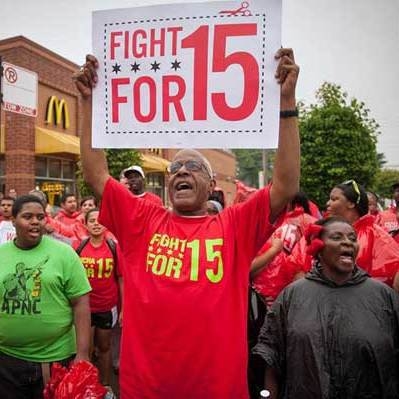 With more and more activists pushing for a $15 minimum wage, and more and more states heading in that direction, research is being done to prove or disprove whether higher minimum wages have negative effects. Of course, research is not supposed to be done to prove either way; its supposed to see what the effects are, not focus on good or bad. In any case, studies have been conflicted for years, which has given both sides ammunition, and new research out of Seattle, which recently began raising its minimum wage to $15 has just added to this. One study shows no ill effects, another shows some workers are losing pay and hours (PDF). The reason for all this uncertainty is there are so many variables involved.
With more and more activists pushing for a $15 minimum wage, and more and more states heading in that direction, research is being done to prove or disprove whether higher minimum wages have negative effects. Of course, research is not supposed to be done to prove either way; its supposed to see what the effects are, not focus on good or bad. In any case, studies have been conflicted for years, which has given both sides ammunition, and new research out of Seattle, which recently began raising its minimum wage to $15 has just added to this. One study shows no ill effects, another shows some workers are losing pay and hours (PDF). The reason for all this uncertainty is there are so many variables involved.
Supportive studies tend to show that wages have not decreased and prices have not risen, but this ignores a multitude of factors. Employers may tolerate an increased cost (labor) because the alternative would be worse. It hurts their wallet, which ends up hurting the workers elsewhere that they might otherwise buy things from. It is good to see a study looking at hour cuts, but all of these studies only look at aggregate statistics, not real people. A proper minimum wage study would select specific businesses at random, and specific workers at random, and follow them for several years. Currently, a study might observe Bob getting his hours cut and quitting, to be replaced by John, who is a little more productive, as having no effect on minimum wage. The study might completely miss the hours cut, and would just see that a worker is still working, even if its not the same worker.
Other studies show prices arent going up, as critics commonly claim. But they are! Shelf and menu prices almost never go up; businessowners hold out as long as possible. Instead, they shrink containers and portions, noticeably raising the unit price. I strongly suspect that restaurants (which are the focus of most minimum wage studies) are starting to make seven plates of food out of what used to fill six. The price remains the same, but you get less. A snarky individual might point out that our portion sizes are too big as is, dodging the point. The minimum wage cost increase is made nearly invisible to the eye, but not the scale or the stomach. Does any researcher study this? I have yet to see one; the results would be devastating to the cause. We already see this with containers in stores. A half gallon of ice cream is now closing in on a quart, and more air is pumped in. I remember orange juice being sold for 64oz by Tropicana, and now its around 59oz. But nobody notices this, or they blame the greedy companies, not the government disrupting the economy with inflation, taxes, and regulations.
On the other side, minimum wage opponents fail to consider employer tolerance and a complete appraisal of the costs. The most important thing for an employer is to remain in business. A few extra costs here and there, such as labor increases can be accepted. The take home pay might be less, but thats better than nothing, for awhile. Indeed, it might actually cost more to cut hours or employees than it is to pay the increase. If there is inventory that needs to be packed out on shelves, having an expensive worker is cheaper than not selling things because the laid off worker is leaving them in the back. Libertarians and conservatives often do not consider this, and it might be another reason why some studies show minimum wage has few negative effects. A decline in profits, of course, is a negative effect. The left may cheer businessmen losing money, but they have families to feed too, and they also can spend that money, now lost, at local businesses.
Ultimately, it is best to let workers and businessowners negotiate their own transactions. That is the most fair to everyone. A worker knows what he needs. If a job does not offer enough pay, he will go elsewhere. And if that is too difficult, its likely that some other government interference is the reason, but getting into that is beyond the scope of this post. Basic logic and economics axioms make clear that minimum wage increases will not be good for anyone really. Austrian economists claim that economics is far too complex for straight empiricism, and they are right. Empiricism begins to break down beyond physics and chemistry, which is increasingly being noticed when social studies cant be replicated. However, it will make a stronger case if we have clear evidence to back it up. Proper studies that pick into every possible variable and account for them are necessary.

Would it be OK if I cross-posted this article to WriterBeat.com? I’ll be sure to give you complete credit as the author. There is no fee, I’m simply trying to add more content diversity for our community and I liked what you wr6ote. If “OK” please let me know via email.
Autumn
AutumnCote@WriterBeat.com